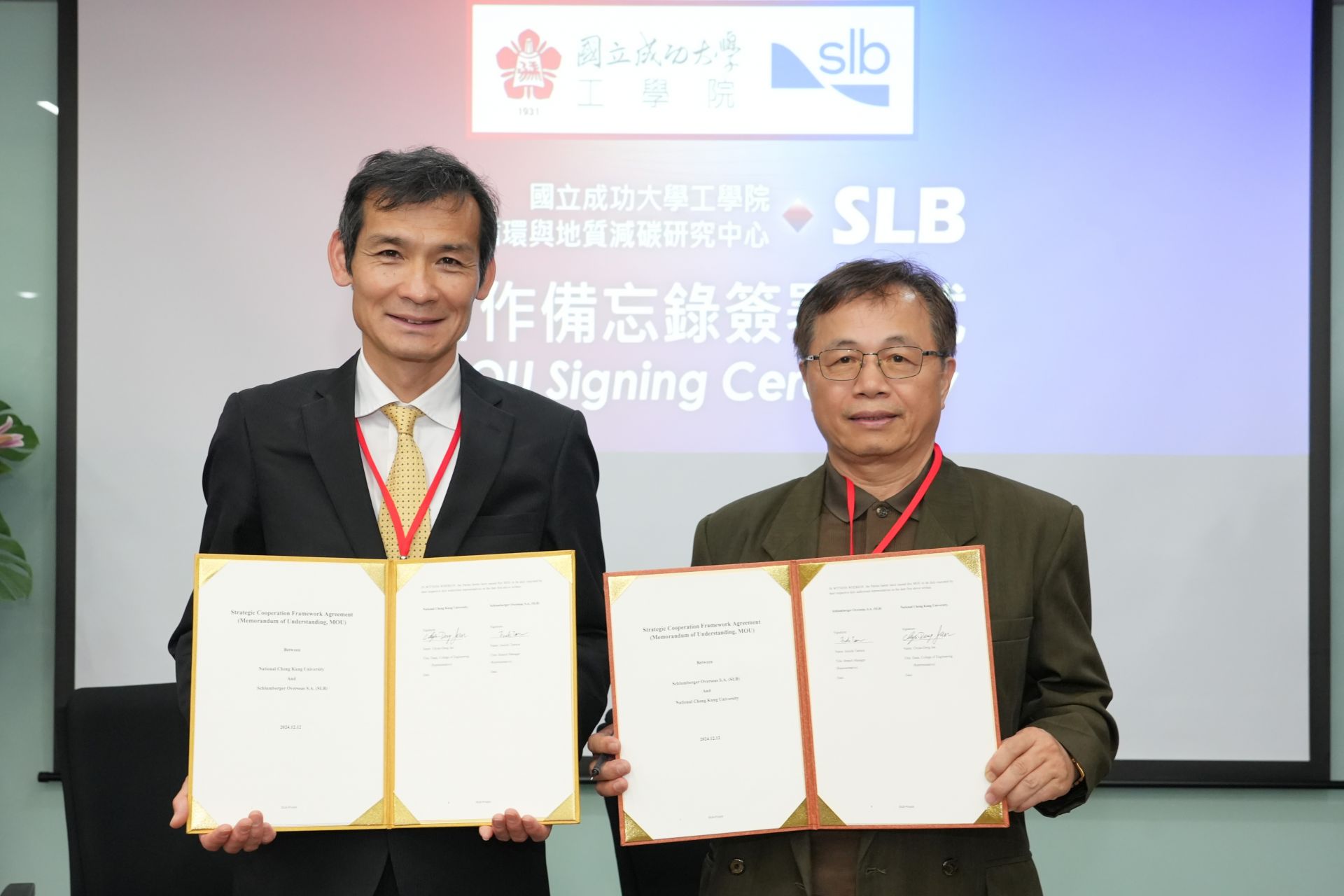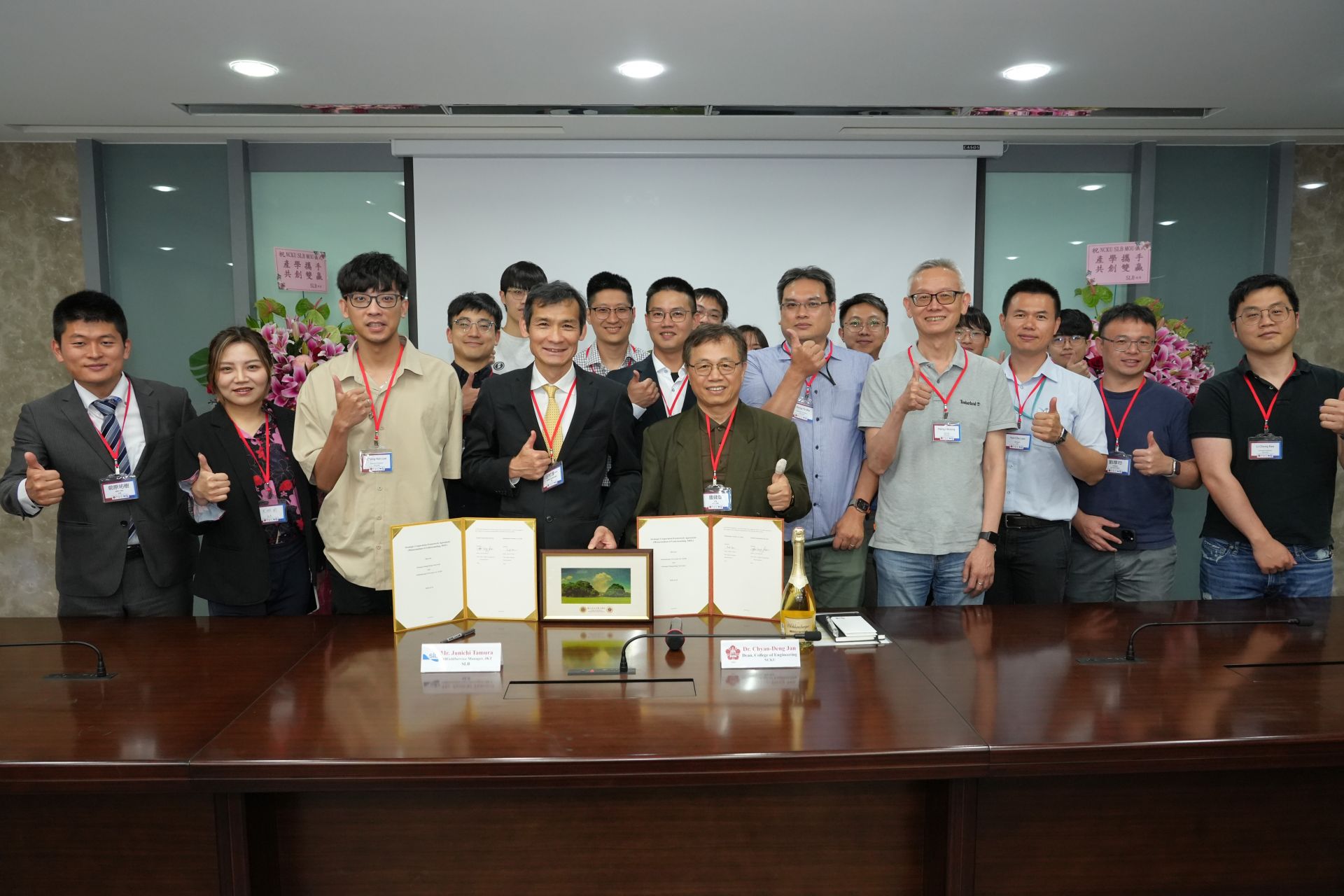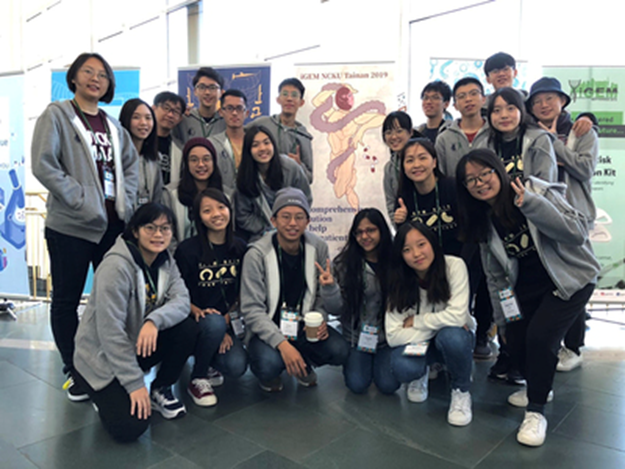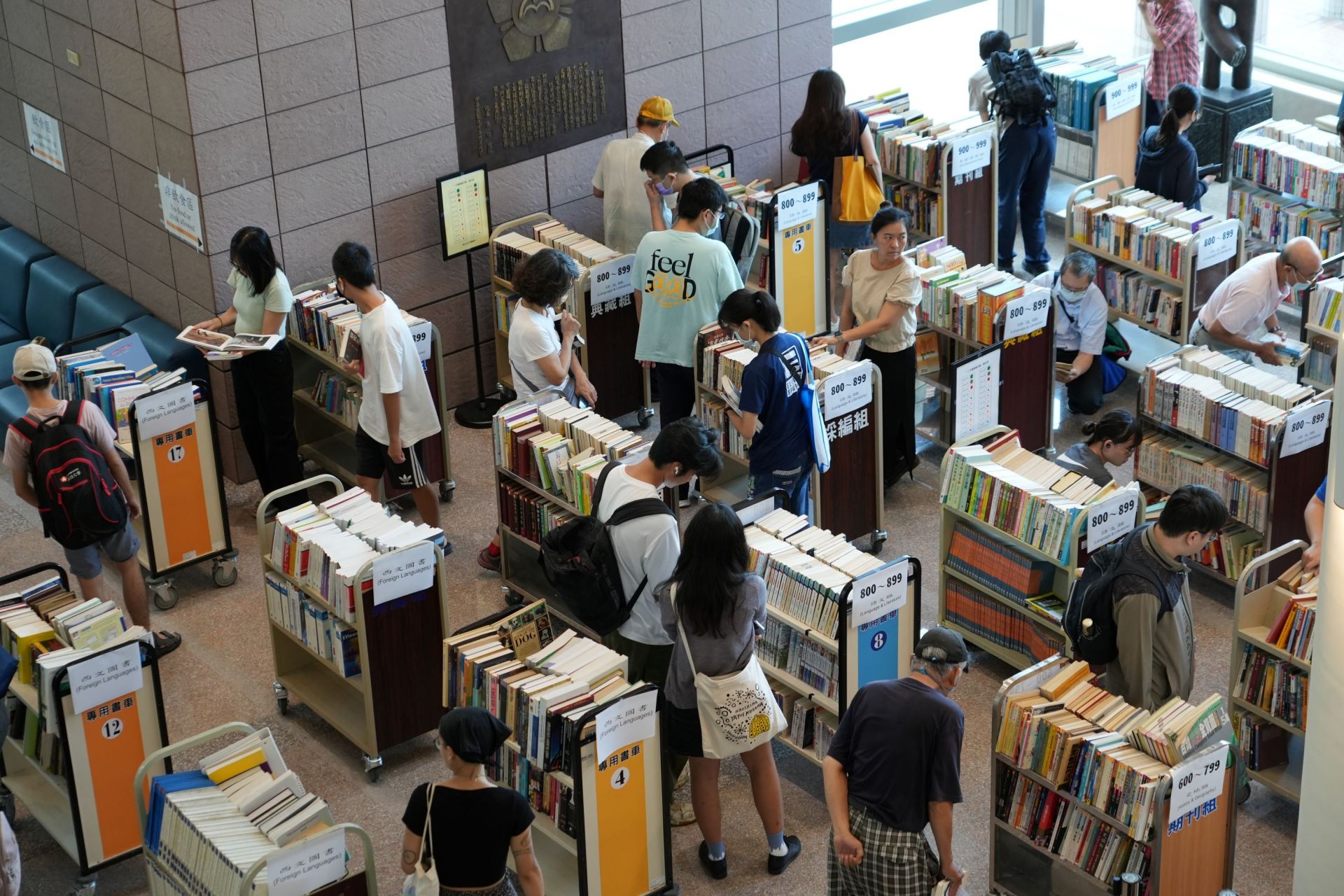SDG12
College of Engineering at NCKU Signs MOU with Global Energy Services Leader SLB to Build a More Sustainable Future for Taiwan
Written by the College of Engineering in NCKU. Image credit to NCKU News Center.
At a ceremony hosted at NCKU’s Resource Circulation and Geological Carbon Reduction Research Center, Dean Chyan-Deng Jan and SLB’s Oilfield Services Manager for Japan, Korea, and Taiwan, Mr. Junichi Tamura, formalized a partnership that promises significant advancements in Taiwan’s green economy and net-zero transition. The agreement symbolizes both organizations' commitment to leveraging their collective strengths to foster technological breakthroughs and practical applications in sustainable energy and climate resilience.
Dean Jan emphasized the strategic significance of this alliance, remarking, “NCKU has always championed robust collaborations with industry leaders. This partnership with SLB marks a renewed commitment to combining academic rigor with advanced engineering to address Taiwan’s critical energy and environmental challenges.”
Mr. Tamura echoed this sentiment, highlighting SLB’s extensive global experience and its commitment to delivering cutting-edge solutions: “Bringing SLB’s proven expertise in geothermal exploration and carbon storage to NCKU, a hub of innovation and local geological insights, creates powerful synergy essential for Taiwan’s sustainable future.”
The partnership will initially focus on three critical areas:
1.Geological Carbon Storage Research: Developing secure, economical, and efficient carbon dioxide storage solutions tailored to Taiwan’s geological characteristics, directly supporting the nation’s ambitious net-zero emissions goals.
2.Advancing Geothermal Energy: Leveraging SLB’s advanced geothermal technologies and NCKU’s profound geological knowledge to accelerate the development of clean, renewable energy sources vital for Taiwan’s energy diversification strategy.
3.Carbon Reduction Engineering and Talent Development: Joint research initiatives, internships, and academic-industry forums will be established to cultivate skilled professionals and accelerate the real-world implementation of innovative carbon reduction techniques.
NCKU’s Resource Circulation and Geological Carbon Reduction Research Center has earned a reputation for pioneering studies in resource recycling and geological carbon sequestration. Its comprehensive approach integrates waste material valorization with sophisticated geothermal exploration and robust engineering methodologies. The center provides critical services to industries, including well planning, computational modeling, and long-term risk assessments crucial for sustainable CO₂ storage.
SLB contributes a legacy of excellence spanning decades, equipped with high-performance drilling technologies, advanced geophysical studies, precise reservoir monitoring, and sophisticated carbon capture methods. Its global footprint and technological leadership position SLB as an ideal partner in Taiwan’s critical transition towards environmental sustainability.
This partnership is not merely symbolic—it signals tangible action toward a greener, sustainable Taiwan. By combining global technological prowess with localized academic innovation, NCKU and SLB set an ambitious precedent for academia-industry collaboration aimed at safeguarding our planet's future.
Provider: NCKU News Center
Date: 2025-04-25
At a ceremony hosted at NCKU’s Resource Circulation and Geological Carbon Reduction Research Center, Dean Chyan-Deng Jan and SLB’s Oilfield Services Manager for Japan, Korea, and Taiwan, Mr. Junichi Tamura, formalized a partnership that promises significant advancements in Taiwan’s green economy and net-zero transition. The agreement symbolizes both organizations' commitment to leveraging their collective strengths to foster technological breakthroughs and practical applications in sustainable energy and climate resilience.
Dean Jan emphasized the strategic significance of this alliance, remarking, “NCKU has always championed robust collaborations with industry leaders. This partnership with SLB marks a renewed commitment to combining academic rigor with advanced engineering to address Taiwan’s critical energy and environmental challenges.”
Mr. Tamura echoed this sentiment, highlighting SLB’s extensive global experience and its commitment to delivering cutting-edge solutions: “Bringing SLB’s proven expertise in geothermal exploration and carbon storage to NCKU, a hub of innovation and local geological insights, creates powerful synergy essential for Taiwan’s sustainable future.”
The partnership will initially focus on three critical areas:
1.Geological Carbon Storage Research: Developing secure, economical, and efficient carbon dioxide storage solutions tailored to Taiwan’s geological characteristics, directly supporting the nation’s ambitious net-zero emissions goals.
2.Advancing Geothermal Energy: Leveraging SLB’s advanced geothermal technologies and NCKU’s profound geological knowledge to accelerate the development of clean, renewable energy sources vital for Taiwan’s energy diversification strategy.
3.Carbon Reduction Engineering and Talent Development: Joint research initiatives, internships, and academic-industry forums will be established to cultivate skilled professionals and accelerate the real-world implementation of innovative carbon reduction techniques.
NCKU’s Resource Circulation and Geological Carbon Reduction Research Center has earned a reputation for pioneering studies in resource recycling and geological carbon sequestration. Its comprehensive approach integrates waste material valorization with sophisticated geothermal exploration and robust engineering methodologies. The center provides critical services to industries, including well planning, computational modeling, and long-term risk assessments crucial for sustainable CO₂ storage.
SLB contributes a legacy of excellence spanning decades, equipped with high-performance drilling technologies, advanced geophysical studies, precise reservoir monitoring, and sophisticated carbon capture methods. Its global footprint and technological leadership position SLB as an ideal partner in Taiwan’s critical transition towards environmental sustainability.
This partnership is not merely symbolic—it signals tangible action toward a greener, sustainable Taiwan. By combining global technological prowess with localized academic innovation, NCKU and SLB set an ambitious precedent for academia-industry collaboration aimed at safeguarding our planet's future.
Provider: NCKU News Center
Date: 2025-04-25

Prof. Chyan-Deng Jan (right), Dean of the College of Engineering and Distinguished Professor and Mr. Junichi Tamura, SLB’s Oilfield Services Manager for Japan, Korea, and Taiwan, sign a Memorandum of Understanding on behalf of their respective parties

Group photo of participants after the signing ceremony
![[Phoenix Lecture] Academician Yuan-Tseh Lee Visits NCKU to Discuss "New Development Models for Human Sustainable Existence"](/userfiles/images/20240612032058268.jpg)
SDG12[Phoenix Lecture] Academician Yuan-Tseh Lee Visits NCKU to Discuss "New Development Models for Human Sustainable Existence"
View more
SDG12NCKU iGEM Team Wins the 2019 iGEM Competition Grand Prize with the Highest Scores in Taiwan’s Participation History
View more



















